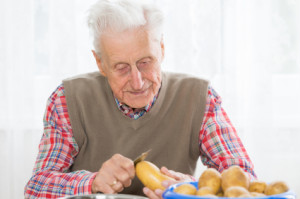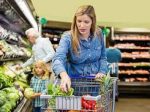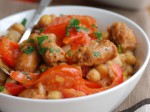 As more people choose to live alone, the process of cooking for one is “hotting up” as an important health issue.
As more people choose to live alone, the process of cooking for one is “hotting up” as an important health issue.
Coming home to a nutritious cooked family meal was once the norm for many of us. Recent social change however is now seeing more people living in single dwellings many of whom are turning to meals “on the run” that are quick and easy to prepare.
The numbers are skyrocketing!
- In New Zealand the number of one person households is projected to increase by 240,000 from 363,000 in 2006 to 602,000 in 2031.
- 61% of this growth will be in the 60 years and over age group by 2031 compared to 49% in 2006.
- This is a global phenomenon with Euromonitor International reporting that one person households in the UK has increased from 153 million in 1996 to 277 million in 2011. A colossal 80% increase in just 15 years.
- When we consider that there are also people who flat with others but eat alone, the scale of the “meals for one” issue becomes greater and is relevant to young and old.
What is driving this change?
Economic trends
Young people, particularly young women are ahead of the game. No longer dependent on their partners for economic stability, many young women are now in high paying occupations, delaying marriage and living alone. Also many people now travel with their jobs which can involve over night or longer periods away from home and eating alone.
Fragmentation of family units
As the rate of divorce and separation increases more “new singles” are choosing to live alone or in flatting situations where they manage their own meals.
Technological changes
Studies by Watties® and Tegel® in the 1994 found that people enjoyed family meals because it provided an opportunity to catch up with each other and stay connected. While family meals do still matter,social networking has enabled people to stay “connected” and find support from friends. Living alone need no longer to mean “feeling isolated” or “left on the shelf”.
Urbanisation
As people chose to live closer to their place of work, many people are moving into inner city apartments. Urbanisation has also reduced the time some people spend travelling to work each day. Evenings in the city maybe spent by some people working later, socializing with friends or going to the gym after work rather than taking more time preparing meals. Eating out at night or having a hot meal in the city midday may be an easier option than cooking a meal after a tiring day.
Longevity
With better medical care and community services, people are living longer and preferring to live independently in their own homes for as long as possible, rather than in retirement villages or institutions.
Common concerns
Lack of motivation
Where once the main meal of the day was prioritized, people today are busy and often turn to quick meals to satisfy their hunger. Irrespective of their age people, living alone, may find preparing an evening meal for one a chore.Grief at the loss of a loved one can also reduce appetite and the desire to prepare meals
“Is it worth it?”; “I can’t be bothered cooking” “Who care’s what I eat?”; “I’ll be good tomorrow”; “I seesaw between being healthy one day to eating ‘crap food’ the next”; “Takeaways are a God send”. “Jam on toast or a biscuit will do”.
These are some of the statements that Dietitian’s are encountering. .
Lack of cooking skills
For some young people, or those living alone following separation or death of a spouse, there may be a lack of cooking experience or skills. A common problem is getting the timing right so that the vegetables don’t overcook and meat has time to tenderize. Cooking classes for men, in particular, who would like to improve their cooking skills are now being offered in Christchurch. Contact Senior Chef www.seniorchef.co.nz for more details.
Eating late at night
For people who work late, or go to the gym on the way home from work at night, it can mean that by the time a meal is prepared and cooked it may be 9-10pm before it is eaten. Going to bed soon after eating a main meal can lead to rapid weight gain.
A lack of planning
“I can’t plan meals because I eat out a lot”; “I’m never home”;“I can never get the quantities right and always have leftovers which I have to throw out”; “By the time I buy all the basic ingredients it is cheaper to eat out”. These type of arguments are common reasons why main meals can become haphazard affairs.
Effects on health
While there are many people who thrive when living alone, others may develop eating habits that can affect their health.
- Sleep deprivation– eating late can interrupt sleep. For more information read Lea’s article “Sleep deprivation affects nutritional well-being”
- Weight gain and Type 2 diabetes can develop when snack foods replace main meals as these foods tend to lack dietary fibre and contain more saturated fat, salt and sugar.
- Weight loss is also a concern, particularly for women and the elderly, when meat or other protein sources are replaced with toast or snack foods.
- Vitamin and mineral deficiencies, particularly of iron and calcium can occur when meat, dairy products along with fruit and vegetable intakes fall.
- Alcohol intake can increase resulting in failing physical and mental condition
- Coronary heart disease and some forms of cancer can become an issue when takeaway meals, fries, crisps and confectionary push up the intake of saturated fat and trans fats.
- Lack of exercise can be a problem as when living alone, with more tasks to take care of, the inclination to exercise after work may be too daunting for some. For help read Lea’s article “Tips to move off the couch”
- Mental health concerns associated with disordered eating, alcohol intake and anxiety can affect people of any age groups, but may go undetected when people live alone.
It’s only too late if you don’t start now!
Tips to help “singles”
Restore some balance
- Start with breakfast and irrespective of your age and activity level aim to have some cereal, fruit, milk and yoghurt before you start your day..
- Have some protein at every main meal in order to build muscle repair tissue and sustain your appetite. So for breakfast maybe an egg or a cheese slice or a pottle of yoghurt. Midday some fish or egg or cheese. Then at night some meat or poultry, fish or beans. Keep portions to no greater than the palm of your hand (or half a palm if overweight).
- You do need carbohydrate for energy. Such as cereal and bread, fruits and vegetables
- Limit the fats by cutting down on fried foods, excess meat, biscuits, cakes and confectionery as these contain saturated and trans fats. Instead use unsaturated fats such as vegetable oil, polyunsaturated margarine and humus as these are helpful for brain and nerve health.
- Drink more low-fat milk and water and less alcohol, carbonated drinks and juice. This will aid digestion and help to circulate energy around your body.
- Exercise more by aiming for around an hour each day.
- Control the snacking read Lea’s article “Are you a “sneaky snacker?” for quick ideas.
Share more to save more
- Set up a co-op. If you live on your own see if you can share (and swap) some cheaper bulk buys with friends. E.g. fresh potatoes, oranges, carrots, pumpkin.
- Grow a garden ( or tub on your porch) with friends and share the produce
- Invite others over for a pot luck dinner occasionally
- Buddy up with a friend if the motivation to exercise is lacking
Try to curb wastage
- Buy frozen mixed vegetables or smaller servings of fresh vegetables such as single carrots or courgettes; cauliflower halves and pumpkin quarters.
- Cook some casseroles such as Beef Stroganoff, chicken casserole or a Bolognaise sauce and freeze in single serving amounts to use at a later date.
- Freeze sliced bread or rolls and just take out what you need each day.
- Buy individual Quiches as heated through with some frozen vegetables and a roll can make a quick meal
- Keep Panini’s, pita pockets and pizza bases in your freezer to transform into easy meals.
Examples of healthy quick meals for one
- Individual Quiche, salad a bread roll and fruit
- Poached eggs on toast with grill mushrooms and tomatoes
- Grilled steak or salmon with frozen vegetables or salad and potato or bread
- Penne pasta with seafood sauce (See Lea’s recipe for Seafood Pasta)
- Chicken souvlaki with fruit and yoghurt
- A mushroom or onion omelette with salad and potato or bread
- Chicken breast cooked with canned tomatoes served with potato and salad
- Pita pocket or Panini filled with chilli beans, coleslaw and low-fat cheese
- If having a takeaway refer to Lea’s article “Healthy ideas for family takeaways”
If you, or somebody you love, are needing help and motivation to eat well and stay healthy then do contact us today.
































































Leave a Reply